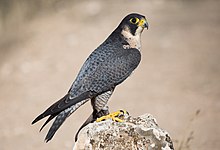매
(see above for suffixes)
| ||||||||||
| 매맥맦맧맨맩맪 맫맬맭맮맯맰맱 맲맳맴맵맶맷맸 맹맺맻맼맽맾맿 | |
| 마 ← | → 먀 |
|---|---|
Korean
[edit]Etymology 1
[edit]
First attested in the Worin seokbo (月印釋譜 / 월인석보), 1459, as Middle Korean 매〯 (Yale: mǎy).
Pronunciation
[edit]- (SK Standard/Seoul) IPA(key): [mɛ(ː)] ~ [me̞(ː)]
- Phonetic hangul: [매(ː)/메(ː)]
- Though still prescribed in Standard Korean, most speakers in both Koreas no longer distinguish vowel length.
| Romanizations | |
|---|---|
| Revised Romanization? | mae |
| Revised Romanization (translit.)? | mae |
| McCune–Reischauer? | mae |
| Yale Romanization? | māy |
Noun
[edit]- hawk
- (specifically) the peregrine falcon (Falco peregrinus)
- Synonym: 송골 (songgol)
Derived terms
[edit]See also
[edit]Etymology 2
[edit]First attested in the Seokbo sangjeol (釋譜詳節 / 석보상절), 1447, as Middle Korean 매〮 (Yale: máy).
Pronunciation
[edit]- (SK Standard/Seoul) IPA(key): [mɛ] ~ [me̞]
- Phonetic hangul: [매/메]
| Romanizations | |
|---|---|
| Revised Romanization? | mae |
| Revised Romanization (translit.)? | mae |
| McCune–Reischauer? | mae |
| Yale Romanization? | may |
Noun
[edit]매 • (mae)
Derived terms
[edit]Etymology 3
[edit]
First attested in the Worin seokbo (月印釋譜 / 월인석보), 1459, as Middle Korean 매〮 (Yale: máy).
Pronunciation
[edit]- (SK Standard/Seoul) IPA(key): [mɛ] ~ [me̞]
- Phonetic hangul: [매/메]
| Romanizations | |
|---|---|
| Revised Romanization? | mae |
| Revised Romanization (translit.)? | mae |
| McCune–Reischauer? | mae |
| Yale Romanization? | may |
Noun
[edit]매 • (mae)
Derived terms
[edit]Etymology 4
[edit]Sino-Korean word from 每.
Pronunciation
[edit]- (SK Standard/Seoul) IPA(key): [mɛ(ː)] ~ [me̞(ː)]
- Phonetic hangul: [매(ː)/메(ː)]
- Though still prescribed in Standard Korean, most speakers in both Koreas no longer distinguish vowel length.
| Romanizations | |
|---|---|
| Revised Romanization? | mae |
| Revised Romanization (translit.)? | mae |
| McCune–Reischauer? | mae |
| Yale Romanization? | māy |
Determiner
[edit]Derived terms
[edit]- See the hanja entry at 每 for Sino-Korean compounds of 매 (每, mae).
Etymology 5
[edit]First attested in the Neung'eomgyeong eonhae (楞嚴經諺解 / 능엄경언해), 1461, as Middle Korean ᄆᆡ이〮 (Yale: mòyí), originally the adverbial form of Middle Korean ᄆᆡᆸ다〮 (Yale: mòyp-tá, “to be severe”) > modern 맵다 (maepda, “to be spicy”), but no longer perceivable as such due to sound and semantic shifts.
Pronunciation
[edit]- (SK Standard/Seoul) IPA(key): [mɛ(ː)] ~ [me̞(ː)]
- Phonetic hangul: [매(ː)/메(ː)]
- Though still prescribed in Standard Korean, most speakers in both Koreas no longer distinguish vowel length.
| Romanizations | |
|---|---|
| Revised Romanization? | mae |
| Revised Romanization (translit.)? | mae |
| McCune–Reischauer? | mae |
| Yale Romanization? | māy |
Adverb
[edit]매 • (mae) (now chiefly dialectal)
Derived terms
[edit]Etymology 6
[edit]Sino-Korean word from 枚.
Pronunciation
[edit]- (SK Standard/Seoul) IPA(key): [mɛ] ~ [me̞]
- Phonetic hangul: [매/메]
| Romanizations | |
|---|---|
| Revised Romanization? | mae |
| Revised Romanization (translit.)? | mae |
| McCune–Reischauer? | mae |
| Yale Romanization? | may |
Counter
[edit]Derived terms
[edit]- See the hanja entry at 枚 for Sino-Korean compounds of 매 (枚, mae).
See also
[edit]Etymology 7
[edit]Pronunciation
[edit]- (SK Standard/Seoul) IPA(key): [mɛ] ~ [me̞]
- Phonetic hangul: [매/메]
| Romanizations | |
|---|---|
| Revised Romanization? | mae |
| Revised Romanization (translit.)? | mae |
| McCune–Reischauer? | mae |
| Yale Romanization? | may |
Ideophone
[edit]매 • (mae)
Etymology 8
[edit]Korean reading of various Chinese characters.
Syllable
[edit]매 (mae)
- Character boxes with compositions
- Hangul Syllables block
- Hangul script characters
- Korean terms inherited from Middle Korean
- Korean terms derived from Middle Korean
- Native Korean words
- Korean terms with long vowels in the first syllable
- Korean terms with IPA pronunciation
- Korean lemmas
- Korean nouns
- Korean terms with usage examples
- Korean terms with uncommon senses
- Sino-Korean words
- Korean determiners
- Korean adverbs
- Korean dialectal terms
- Korean counters
- Korean onomatopoeias
- Korean ideophones
- Hanja readings
- ko:Birds of prey